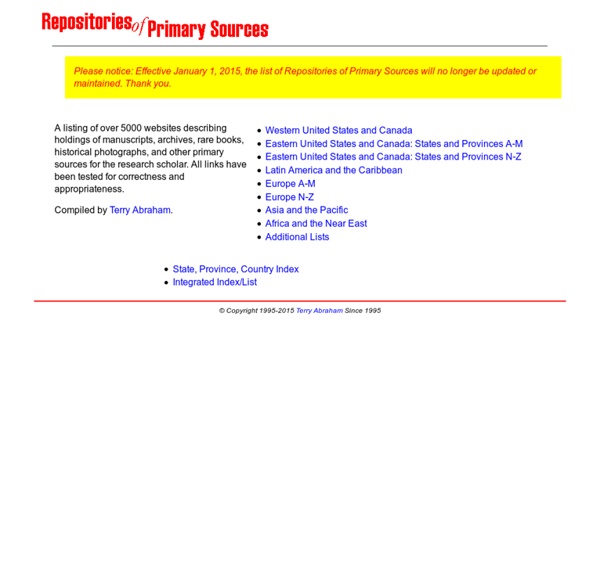



http://webpages.uidaho.edu/special-collections/Other.Repositories.html
Related: Primary SourcesNational Art Inventories What are the Inventories? The Inventories of American Painting and Sculpture document more than 400,000 artworks in public and private collections worldwide. The Inventory of American Paintings includes works by artists who were active in America by 1914. The Inventory of American Sculpture has no cut-off date and includes works from the colonial era through contemporary times. These online databases are supplemented by a photographic collection of over 80,000 images. The photographs are available for study purposes in our Washington, D.C., office. Welcome to ARTstor Far Left Robert Henri La Reina Mora, 1906 Colby College Museum of Art Top Center Winslow Homer Girl Reading, 1879 Colby College Museum of Art Bottom Center Winslow Homer Girl in a Hammock, 1873 Colby College Museum of Art
Internet History Sourcebooks Project Internet History Sourcebooks Project Paul Halsall, Editor Last Modified: Dec 11 | linked pages may have been updated more recently The Internet History Sourcebooks Project is a collection of public domain and copy-permitted historical texts presented cleanly (without advertising or excessive layout) for educational use. 1. The University of Oklahoma College of Law: A Chronology of US Historical Documents Links marked with an asterisk (*) are to other websites and will open in a new window. Pre-Colonial To 1600 Skills for Online Searching - ipl2 A+ Research & Writing Learn how search syntax works Search syntax is a set of rules describing how users can query the database being searched. Sophisticated syntax makes for a better search, one where the items retrieved are mostly relevant to the searcher's need and important items are not missed. It allows a user to look for combinations of terms, exclude other terms, look for various forms of a word, include synonyms, search for phrases rather than single words.
Primary Sources: Overview of Collections One of the nation’s top collections of rare law books is housed in the Paskus-Danziger Rare Book Room of the Lillian Goldman Library at the Yale Law School. The collection is particularly strong in Anglo-American common law materials, including case reports, digests, statutes, trials, treatises, and popular works on the law. Other strengths include Roman and canon law, international law (especially the works of Hugo Grotius and Samuel Pufendorf), and early law books from most European countries. Of special interest ...
Unintentional Knowledge - The Chronicle Review By Julio Alves I started teaching writing in graduate school 20-plus years ago, and it did not take me long to start looking forward to the pile of research papers at the end of the semester. Unlike much of the writing earlier in the semester, done from assigned readings and carefully crafted prompts, the research papers tackled broad, open-ended questions. Civil War Primary Sources Primary Documents by Topic: Most Popular Official Records Addresses & Speeches Acts, Bills, & Orders Military Correspondence & Documents Personal Correspondence & Narratives Prints & Photos Maps Document Collections Getting Started Primary Documents
The legitimacy and usefulness of academic blogging will shape how intellectualism develops Academic blogging has become an increasingly popular form, but key questions still remain over whether blog posts should feature more prominently in formal academic discourse. Jenny Davis clarifies the pros and cons of blog citation and sees the remaining ambiguity as indicative of a changing professional landscape. The wider scholarly community must learn how to grapple with these ethical and professional questions of rigor in standards of academic sourcing. In this post I attempt to tackle a complex but increasingly important question: Should writers cite blog posts in formal academic writing (i.e. journal articles and books)?
Primary Source Sets Digital Public Library of America (DPLA) Primary Source Sets are designed to help students develop critical thinking skills by exploring topics in history, literature, and culture through primary sources. Drawing online materials from libraries, archives, and museums across the United States, the sets use letters, photographs, posters, oral histories, video clips, sheet music, and more. Each set includes a topic overview, ten to fifteen primary sources, links to related resources, and a teaching guide. Visual Literacy in an Age of Data Statistician Hans Rosling inserts himself into charts during a TED talk and creates a narrative around the data. Shazna Nessa explains visual literacy and why it’s critical for data visualizers to take it seriously. It’s not what you look at that matters, it’s what you see.
Flow of Information The Timeline: A look at linear time and information: from the occurrence of an event, era, social movement or discovery, ...to the documentation of evidence relating to this event, era, social movement, etc.to how the evidence is disseminatedand how researchers (and term paper writers) can find this documentation One Day - Days Later